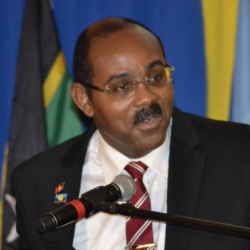Prime Minister Gaston Browne of Antigua & Barbuda made a speech this week at the United Nations to call for restitution in its $100 million online gambling dispute with the United States. Gaston Browe told the 70th Session of the UN General Assembly that his country had been waiting 11 years to see the US make restitution, after it was found guilty of breaches of international law in 2004.
Gaston Browne spoke at an economic development conference in Addis Ababa. He called for reforms of the international economic development model, while saying that the conference itself was facing a serious crossroads, in which it could either create real reform or simply produce a high-sounding declaration with no action behind it.
He also rued the idea that the powers which the conference hoped to influence had not attended the meeting very well.
Might Is Right
In his speech, Gaston Browne said referred to his country’s frustrations in getting repayment by the United States, and how smaller countries find it hard getting justice “against a larger and vastly richer country for a trade violation, that set-back my small country by over $100 million US dollars. That country has failed to settle with us.”
He added that the US’s continued actions to harm the online gambling operations of his country represent continued assult on its rights and finance. Browne said, “Justice delayed is justice denied. After 11 years of not receiving the fruits of this judgment, which incidentally, are lawfully due to my country, my people are entitled to conclude that the powerful continue to ignore and trample the rights of the weak and that might is right.”
Origins of the Dispute
Back in 2004, the United States claimed that Antigue & Barbuda had set itself up as a tax haven for online gambling operators. US officials also complained that those operators accepted American gamblers on their sites, so they did everything in their power to stop their operations. In doing so, Antigua lost a key source of revenue in the form of those licensing fees.
Antigua eventually sued the US government in the World Trade Organization’s international court. The WTO’s court found the United States violated an international treaty it had signed in attacking Antigua & Barbuda financially. According to the terms of the free trade treaty, the US had agreed to allow businesses in other countries the same access they allowed their own companies. Since the US allows gaming operators to take bets from gamblers, they had agreed not to use protectionist policies that discriminated against foreign companies.
US Presidents Ignore WTO Ruling
The administrations of George W. Bush and Barack Obama have ignored that judgment by the WTO. After several years of doing so, Antigua received another ruling in which the WTO said the tiny caribbean nation could collect their lost millions by targeting the royalties American artists, studios, and production companies. Antigua has chosen not to take that route, and continues to negotiate with the United States’ officials. But those negotiations again broke down recently, sending Gaston Browne to the United Nations.
Antigua’s prime minister also referred to a decision by the European Commission recently to list Antigua as a “tax haven.” He defended his country against those charges, saying Antigua had done much to uphold international standards. In fact, Antigua passed the first online gambling regulations on the planet.
Described as a Tax Haven
In describing the “wrongful list” released by the European Commission Browne, he called for the powerful nations and organizations to be more careful in trying to damage his country’s reputation. He said the list “that falsely named several small states in the Caribbean and the Pacific, including Antigua and Barbuda, as ‘tax havens. It cannot be right that our small country’s reputation should be wrongfully tarnished by powerful countries, despite all that we have done, at great cost to our limited resources in order to comply with international standards.”
The speech is likely to be ignored by the United States and the leading European nations, but it is likely to resonate with the vast majority of the members of the General Assembly. That might not translate to any concrete action against the United States, but such actions erode its moral standing, which has often served the US well in international relations. If a great nation cannot keep faith with the treaties it signs on small matters, then it’s hard to convince its allies to force others to keep their faith on great matters. Once a nation shows that is sees treaties as simply existing to be trampled, it’s hard to convince others in the sanctity of treaties.
Diplomacy in Short Supply
In the world of international politics, the smaller states always must navigate choppy waters. It helps when the bigger states which invoke high ideals follow their own advice. Henry Kissinger said, “Diplomacy [is] the art of restraining power.”
The United States has not restrained its power to damage Antigua over the past 11 years, as it has shoved aside diplomacy for the sake of making a point.
This is not the first time Gaston Browne has spoken passionately at the United Nations. In 2014, he spoke at an environmental conference and received high marks for his speech. During that same speech, he called on the powerful nations to offer redress to the small countries, and even called on Barack Obama himself (who was in attendance) to be fairer to small states like his own.

